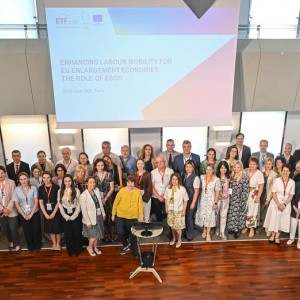COVID-19 and the World of Decent Work

Article on the occasion of 1 May, Labour Day by Majlinda Bregu, Secretary General of the Regional Cooperation Council (RCC)
2021 edition of the International Labour Day: COVID-19 and the World of Decent Work
Around a quarter of youth in the Western Balkans are NEETs – neither in employment, education or training (2019 data). Moreover, out of the total registered unemployed at the end of February 2021, 173,031 are young people, under 24 years, which is more than 12% of all registered unemployed.
“I'm a great believer in luck, and I find the harder I work the more I have of it.”
Thomas Jefferson
We all like to think of 1st of May - the Labour Day as an important holiday marking labour rights but also a fun day to enjoy outdoors, and all hoped last year that it will return in its full glory soon. However, this is the 2nd year in a row that we mark 1st May under completely unusual circumstances, dictated by the COVID-19 pandemic. And who knows, have we seen it all …
What we definitely have seen and realised is the importance of the health sector and the important work that medical workers all around the world carry out to contain the pandemic and save our lives. Just as quickly, we also realised that we can adjust and change our habits fast to best respond to the crisis. For those lucky ones, who were able to keep their jobs just by switching offices for homes to ‘work from home’ or ‘live at work’ it meant a new lifestyle of juggling work and home at the same time. For some jobs it was very difficult to adapt to the new reality of physical distancing, working remotely, lockdowns, etc. What I’m saying is - what do hairdressers do if a hairstyle is no longer important for their home-based, socially-isolated customers? Or their saloons are simply closed? What do tourism service providers do, if traveling becomes a health-hazardous discipline? Finding new models for their businesses to survive.
In Western Balkans (WB) many people just like in the rest of the world have spent the past year or so figuring out how to protect both their jobs and lives. Before COVID-19 crisis, labour markets[1] in the Balkans were already characterised by relatively high unemployment rates (between 10.9% in Serbia and 25.2% in Kosovo* in 2019), especially when compared to the EU; high inactivity (ranging between 59.5% in Kosovo* and 39.4% in Albania in 2019); low levels of employment with a significant share of temporary contracts and informal employment (between 18% and 30%, depending on WB economy and a source). Also, one of the distinctive characteristics of the unemployment in our region was a large share of long-term unemployment. And this is how the corona virus struck us…
Let’s see what the RCC ESAP Observatory numbers tell us: At the end of February 2021, the total registered stock of unemployed, cumulative[2] in WB 6 economies stood at over 1.4 million citizens, compared to February 2020, when this figure was some 1.24 million citizens. Simple mathematics shows that from February 2020 to February 2021 there has been an increase in the total stock of registered unemployed in Western Balkans of some 164,500 citizens, which is around 13.2% increase in total stock of registered unemployed in this 12 month-period. These total figures for WB economies hide important individual WB 6 economy differences. In some economies, there has been almost no increase in registered unemployed in this period, while in others this increase has been much higher than the regional average would suggest.
Where there has not been a large increase in registered stock of unemployed, labour market may have adjusted to the economic shocks triggered by COVID-19 through underemployment and remote work, rather than through unemployment. And although these adjustment mechanisms helped keep workers in their current jobs and avoid a substantial rise in unemployment, these mechanisms may cause a reduction in total pay for workers, especially the low-educated and low-skilled workers, as ILO research indicates. Moreover, such workers tend to be over-represented in sectors that were the most affected by the pandemic (such as tourism and hospitality sector, wholesale and retail trade, transport and storage, etc.). And then there are those workers in grey zone, also prone to layoffs at the first sign of crisis, but most importantly there is youth.
We could go on for (p)ages, listing all the weaknesses of our labour markets that raised their ugly heads in this crisis but no need for that. Every one of us has at least one family member or friend whose job was jeopardised by the pandemic.
And how about youth?
Around a quarter of youth in the Western Balkans are NEETs – neither in employment, education or training (2019 data). Moreover, out of the total registered unemployed at the end of February 2021, 173,031 are young people, under 24 years, which is more than 12% of all registered unemployed. And finally, there is the youth brain drain – a known demographic challenge for our region. Does anyone need convincing that we must act and that youth must be given an opportunity for a job?
Given obvious need to act, we should aim high – for the Youth Guarantee in the WB. Youth Guarantee means opportunities for employment, education, training or apprenticeship for young people. Specifically, in the Western Balkans, RCC ESAP 2 project has developed a comprehensive analytical study on Youth Employment in six Western Balkan economies, with 6 individual policy roadmaps; this report and six policy roadmaps were shared with WB 6 governments recently. We at the RCC are ready to support our government partners to have the Youth Guarantee for our region and other youth programmes, generating more and better job opportunities for young people.
Let’s learn from this crisis, and let’s use it as an opportunity for the recovery process to build a better world of work. To create a labour market as a place of dialogue, equal opportunities, safe and protected environment in which we thrive while providing for ourselves, our families, communities and our society. Simply put – decent work!
Let’s all work together to defeat the common health threat and have a strong recovery with jobs.
Stay healthy, protect yourself and others!


